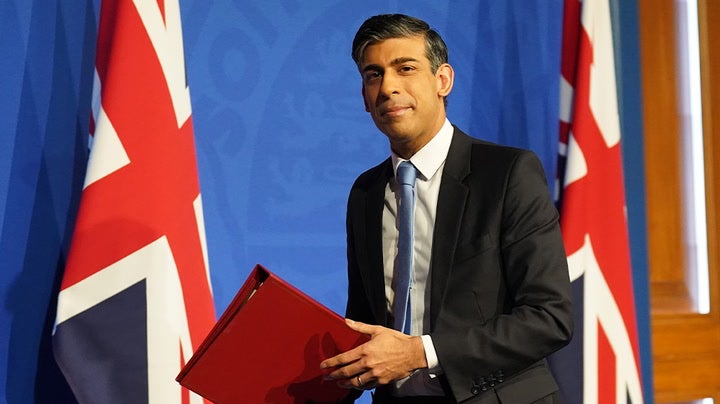Robert Harris is right – Rishi Sunak’s popularity has entered ‘death valley’
With polling this bad, you could almost mistake it for the plot in one of the ‘Fatherland’ author’s new thrillers, writes John Rentoul. Yet the PM soldiers on – or, at least, he’s trying to...


Esteemed political commentator Robert Harris, the Fatherland author, tweeted a comment on today’s YouGov poll giving Labour a 27-point lead: “Death Valley.”
Of course, it is “just one poll”, from a company that tends to report larger Labour leads, and it is different from the recent seat-by-seat megapoll by the same organisation, which gave Labour a lead of half as much, 13.5 per cent. But it underlines Rishi Sunak’s failure to turn the Conservatives’ fortunes round.
He tried again in his news conference in Downing Street this morning, assembling journalists to deliver two unconvincing messages. “The Conservative Party is united,” he said. And: “This is an election year and the choice in that election is clear: stick with the plan that is working or go back to square one with Labour.”
The problem with the claim that “the plan is working” is that terms and conditions apply. Small boat crossings are down by one-third, but Sunak was standing at a lectern that said: “Stop the Boats.” It did not say, “Reduce the Boats by One-Third.”
The small print to the claim that the Conservative Party is “united” is that it is “united in wanting to stop the boats”. Yet it disagrees passionately with itself about how to do it. Which, it turned out, was not even a question for the prime minister. “The question is really for the House of Lords,” Sunak said, when pressed on when flights to Rwanda might actually take off.
While peers ponder that question, voters should stick with the Tories because, Sunak said, “I don’t think Keir Starmer wants to stop the boats.” He mocked the Labour leader’s pledge to “smash the gangs”, saying that is precisely what the government is trying to do. And it is true that Labour’s policy is essentially to do more deals with the French and other countries of the kind that is probably responsible for the reduction in the number of boats last year. But Starmer isn’t in government while Sunak is, which gives Starmer more scope to claim that he will make things better than the leader of a party that has been in power for 14 years.
The other part of the plan that is working, the prime minister said, is that taxes are being cut. Which is true, but they have been cut a little by the party that raised them by a lot, and Labour are busy trying to hide all the evidence that they would like to spend more on public services and green investment.
Sunak claimed that Labour cannot say where the money to fund their £28bn-a-year green plan will come from, so it must come from tax rises. The truth is more disappointing to many Labour supporters and green-inclined voters: that Labour are in the middle of ditching the £28bn promise altogether. The figure is not mentioned, for example, in the party’s campaign guide published this week.
The tax attack doesn’t work for the Tories because they have put taxes up and nobody really knows what the £28bn is for. If it is for green energy, they are all for it. Just as people know that taxes and public spending are always likely to be higher under a Labour government than under a Tory one – but they don’t think Labour would put taxes up as much as the Tories have in recent years, and if a Labour government would spend more on the NHS they would vote for that. Sunak can plead with them that the sums don’t add up, but the opinion polls suggest that people have stopped listening.
Over the past two days, Tory rebel MPs rode into the valley of death, knowing that their public show of disunity would damage the party further, even though they wouldn’t get the impossible legislation that they wanted. Robert Jenrick, who spoke fluently without notes and outshone his former boss and standard-bearer of the anti-immigration wing of the party, Suella Braverman, may have his eyes on the leadership of the party after the election. Others just wanted to be right – an underestimated motive in politics.
The end result was predictable: a prime minister pleading to be allowed to get on with the job. Sunak’s performance at this morning’s news conference was not as abject as John Major’s televised plea to his MPs, during the election campaign in 1997, not to “bind my hands” in European negotiations. Nor was it as unconvincing as Liz Truss’s news conference held in Downing Street as her government disintegrated around her.
But Sunak will not gain any credit for defending the government as best he could, rationally setting out his case and pointing out that the opposition’s alternative is dreadfully thin. The opinion polls are likely to get worse for him, and Tory party discipline will continue to break down.
It is only three days since Isaac Levido, the Australian brought in to run the Tory election campaign, warned MPs that “divided parties fail”, and yet it seems like a very long time ago.






Join our commenting forum
Join thought-provoking conversations, follow other Independent readers and see their replies
Comments